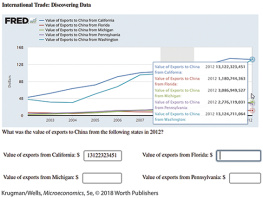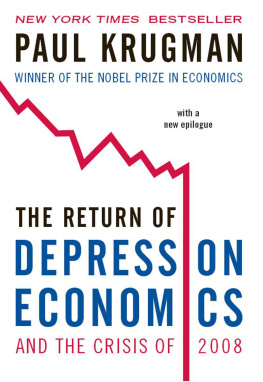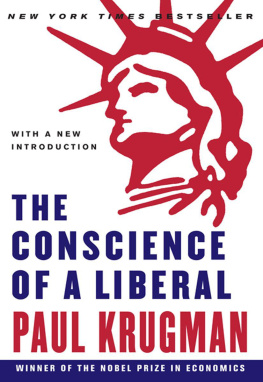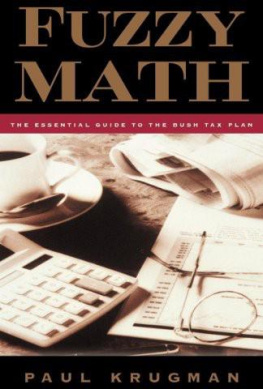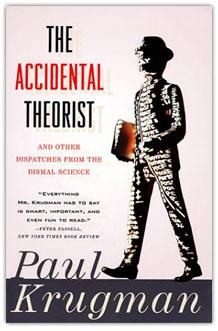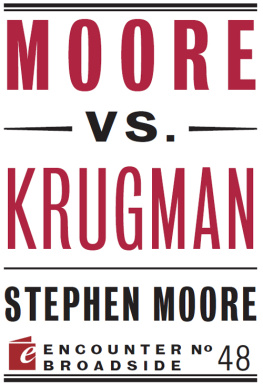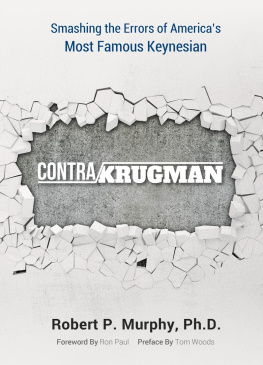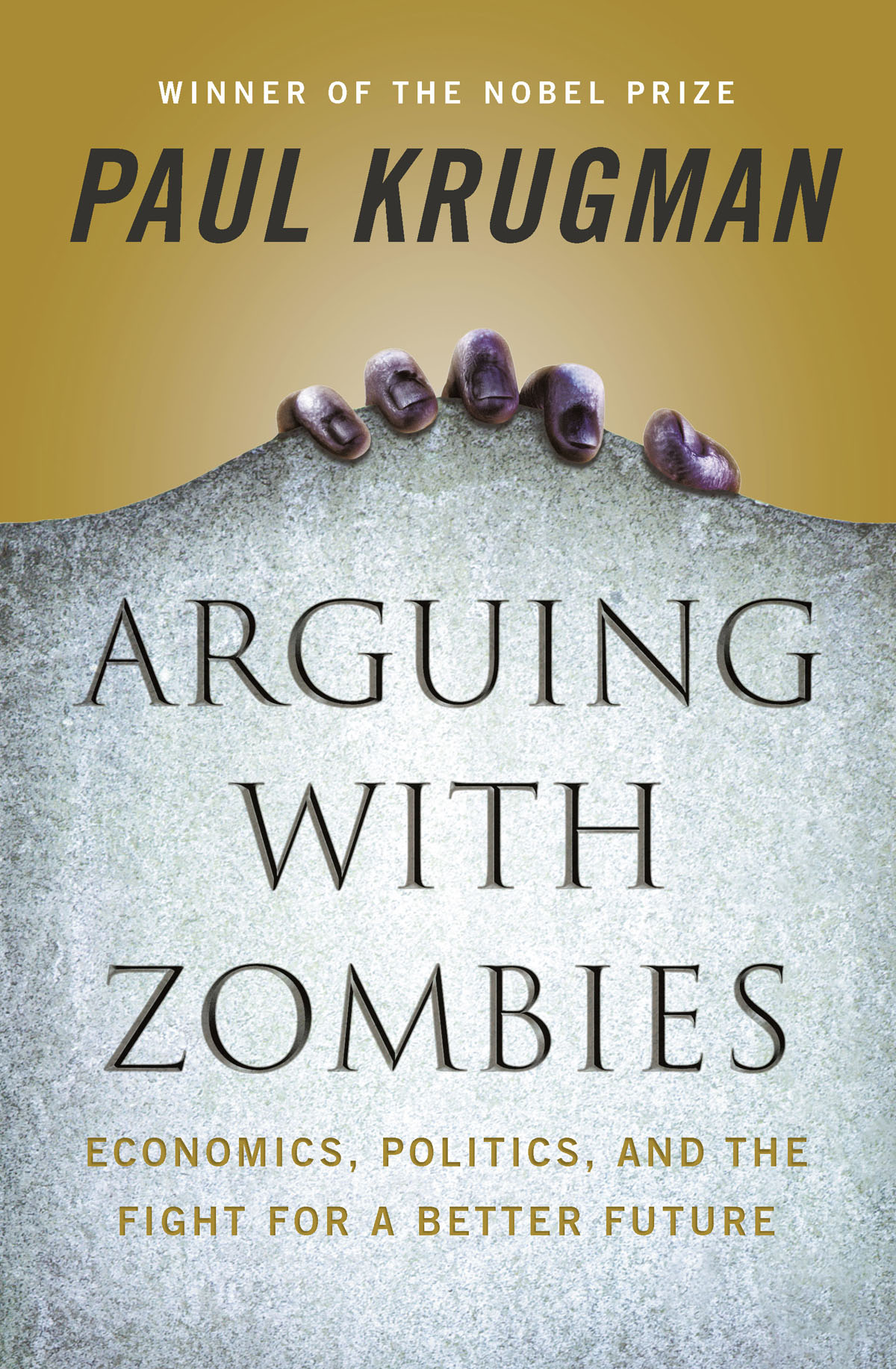Contents
Guide
Page List
ARGUING
with
ZOMBIES
Economics, Politics, and the Fight for a Better Future
Paul Krugman

To the memory of my late colleague and friend Uwe Reinhart, who did more than anyone to advance the discussion of health care economics and helped me in particular avoid making a fool of myself.
CONTENTS
M ost of the articles in this book were originally published as newspaper columns, and the nature of column-writing almost by definition prevents real-time consultation or even collaboration. You get up, have some coffee, decide what youre going to write aboutplanning ahead almost never works, because it gets trumped by eventsand turn something in by 5 p.m. Blog posts, which can go from vague idea to the public domain in a matter of an hour or less, offer even less chance for discussion. In most cases the only person I could turn to for productive critiques and review was my wife, Robin Wells, who often provided invaluable feedback.
Column-writing does, however, rest on a background of ongoing discussion of issues. I drew on the wisdom of many people over the course of the fifteen years work chronicled here. Ill try to name a few of them, in the full awareness that its a hugely incomplete listI literally wrote thousands of columns and blog posts over that period, and often cant even remember who I leaned on for the necessary expertiseand unfairly neglects many.
On health care, I got a lot of help from Uwe Reinhardt, to whom this book is dedicated, and Jonathan Gruber.
Dean Baker helped convince me that we had a huge housing-bubble problem.
Brad DeLong and I sort of double-teamed the call for a Keynesian response to the crisis.
My account of the problems with efficient-market finance drew heavily on work by Justin Fox.
Mike Konczal helped me understand the bad logic of austerian economics, and Simon Wren-Lewis helped me grasp why that bad logic was prevailing in the U.K.
Richard Kogan was, I think, the first person to alert me to the nonexistence of a snowballing-debt problem.
Emmanuel Saez and Gabriel Zucman, aside from teaching all of us a huge amount about taxation, helped me out a lot in understanding new Democratic proposals, especially the Warren wealth tax.
Chad Bown talked me through what was happening with Trumps tariffs.
Larry Mishel taught me most of what I know about the relationship or lack thereof between technology and inequality. More generally, Ive often relied on my Stone Center colleague Janet Gornick to understand what inequality data mean.
Most of what I know about movement conservatism comes from Rick Perlstein.
Another Stone Center colleague, Leslie McCall, helped me get the political science of voter attitudes on taxes and spending right (or at least less wrong).
Correspondence with the inimitable Michael Mann helped me understand the nasty politics of climate science.
Finally, a word of thanks to Nortons Drake McFeely, who has been publishing my trade booksmaking them vastly better than they would otherwise have beensince long before I began writing for the Times.
ARGUING with ZOMBIES
P unditry was never part of the plan.
When I finished graduate school in 1977, I envisioned a life devoted to teaching and research. If I ended up playing any role in public debate, I assumed it would be as a technocratsomeone dispassionately providing policymakers with information about what worked and what didnt.
And if you look at my most cited research, most of it is pretty apolitical. The list is dominated by papers on economic geography and international trade. These papers arent just apolitical; theyre mostly not even about policy. Instead, theyre attempts to make sense of global patterns of trade and the location of industries. They are, to use the economics jargon, positive economicsanalysis of how the world worksnot normative economicsprescriptions for how it should work.
But in 21st-century America, everything is political. In many cases, accepting what the evidence says about an economic question will be seen as a partisan act. For example, will inflation surge if the Federal Reserve buys a lot of government bonds? The clear empirical answer is no if the economy is depressed: the Fed bought $3 trillion in bonds after the 2008 financial crisis, and inflation stayed low. But assertions that Fed policy was dangerously inflationary became, in effect, the official Republican view, so simply recognizing reality became seen as a liberal position.
Indeed, in some cases even asking certain questions is seen as a partisan act. If you ask what is happening to income inequality, quite a few conservatives will denounce you as un-American. As they see it, even bringing up the distribution of income, or comparing the growth in middle-class incomes with those of the rich, is Marxist talk.
And its not just economics, of course. If anything, we economists have it easy compared to climate scientists, who face persecution for reaching conclusions powerful interests dont want anyone to hear about. Or consider social scientists studying the causes of gun violence: from 1996 to 2017 the Centers for Disease Control were literally forbidden to fund research into firearm injuries and deaths.
So whats a would-be scholar to do? One response is to ignore the political heat and just keep doing your research. Thats a choice I can respect, and for most scholars, even in economics, its the right choice.
But we also need public intellectuals: people who will understand and respect the research, but are willing to jump into the political fray.
This book is a collection of articles, mostly written for The New York Times, in which I tried to play that role. Ill talk later about how I got into that position, and what Im trying to do with it. First, though, lets ask a different question: Whats all the politicization about?
THE ROOTS OF POLITICIZATION
There are many issues in politics, and you could imagine people staking out a wide variety of positions that dont correspond to a simple left-right axis. You could, for example, envision voters who are strongly in favor of gun control, demand aggressive policies to fight global warming, but want to see Social Security and Medicare privatized if not eliminated.
In practice, however, politics in modern America really is pretty much one-dimensional. This is especially true among elected representatives. Tell me where a member of Congress stands on issues like universal health care, and you can predict where he or she stands on climate policyand vice versa.
What defines this single political dimension? Its basically the traditional left-right continuum: How much role do you believe public policy should have in reducing the risks and inequalities of a market economy? Do you want society to be like modern Denmark, with its high taxes, strong social safety net, and extensive worker protections, or like America in the Gilded Age, when laissez-faire ruled?
At one level, this axis of contention is about values. People on the left tend to have a concept of social justice along the lines formalized by the philosopher John Rawls: they believe that people should advocate the society theyd choose if they didnt know who they would be, which role they would play. Basically, this moral position is There but for the grace of God go I, although often without the God part.


